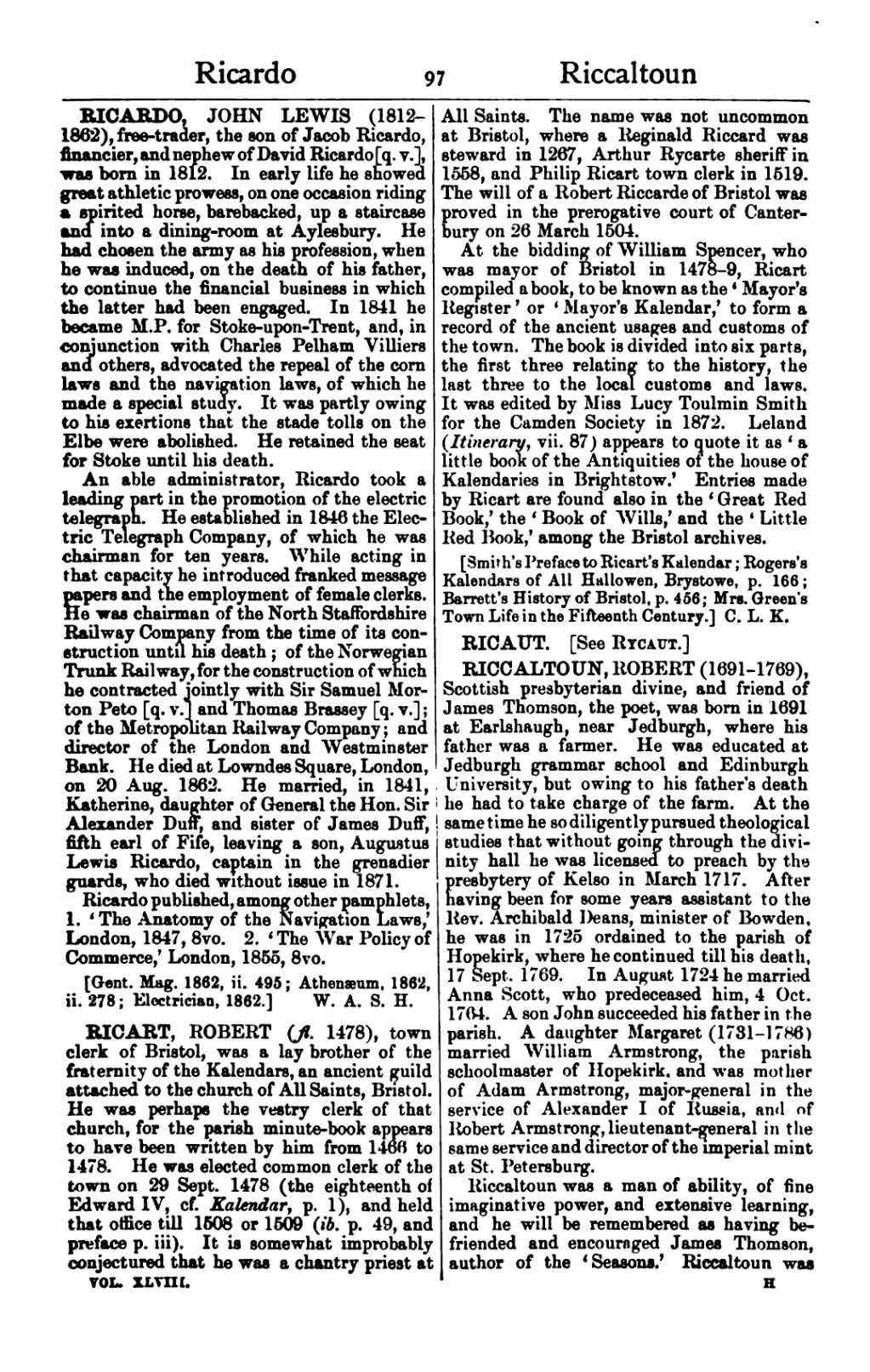RICARDO, JOHN LEWIS (1812–1862), free-trader, the son of Jacob Ricardo, financier, and nephew of David Ricardo [q. v.], was born in 1812. In early life he showed great athletic prowess, on one occasion riding a spirited horse, barebacked, up a staircase and into a dining-room at Aylesbury. He had chosen the army as his profession, when he was induced, on the death of his father, to continue the financial business in which the latter had been engaged. In 1841 he became M.P. for Stoke-upon-Trent, and, in conjunction with Charles Pelham Villiers and others, advocated the repeal of the corn laws and the navigation laws, of which he made a special study. It was partly owing to his exertions that the stade tolls on the Elbe were abolished. He retained the seat for Stoke until his death.
An able administrator, Ricardo took a leading part in the promotion of the electric telegraph. He established in 1846 the Electric Telegraph Company, of which he was chairman for ten years. While acting in that capacity he introduced franked message papers and the employment of female clerks. He was chairman of the North Staffordshire Railway Company from the time of its construction until his death; of the Norwegian Trunk Railway, for the construction of which he contracted jointly with Sir Samuel Morton Peto [q. v.] and Thomas Brassey [q. v.]; of the Metropolitan Railway Company; and director of the London and Westminster Bank. He died at Lowndes Square, London, on 20 Aug. 1862. He married, in 1841, Katherine, daughter of General the Hon. Sir Alexander Duff, and sister of James Duff, fifth earl of Fife, leaving a son, Augustus Lewis Ricardo, captain in the grenadier guards, who died without issue in 1871.
Ricardo published, among other pamphlets, 1. ‘The Anatomy of the Navigation Laws,’ London, 1847, 8vo. 2. ‘The War Policy of Commerce,’ London, 1855, 8vo.
[Gent. Mag. 1862, ii. 495; Athenæum, 1862, ii. 278; Electrician, 1862.]
RICART, ROBERT (fl. 1478), town clerk of Bristol, was a lay brother of the fraternity of the Kalendars, an ancient guild attached to the church of All Saints, Bristol. He was perhaps the vestry clerk of that church, for the parish minute-book appears to have been written by him from 1466 to 1478. He was elected common clerk of the town on 29 Sept. 1478 (the eighteenth of Edward IV, cf. Kalendar, p. 1), and held that office till 1508 or 1509 (ib. p. 49, and preface p. iii). It is somewhat improbably conjectured that he was a chantry priest at All Saints. The name was not uncommon at Bristol, where a Reginald Riccard was steward in 1267, Arthur Rycarte sheriff in 1558, and Philip Ricart town clerk in 1519. The will of a Robert Riccarde of Bristol was proved in the prerogative court of Canterbury on 26 March 1504.
At the bidding of William Spencer, who was mayor of Bristol in 1478–9, Ricart compiled a book, to be known as the ‘Mayor's Register’ or ‘Mayor's Kalendar,’ to form a record of the ancient usages and customs of the town. The book is divided into six parts, the first three relating to the history, the last three to the local customs and laws. It was edited by Miss Lucy Toulmin Smith for the Camden Society in 1872. Leland (Itinerary, vii. 87) appears to quote it as ‘a little book of the Antiquities of the house of Kalendaries in Brightstow.’ Entries made by Ricart are found also in the ‘Great Red Book,’ the ‘Book of Wills,’ and the ‘Little Red Book,’ among the Bristol archives.
[Smith's Preface to Ricart's Kalendar; Rogers's Kalendars of All Hallowen, Brystowe, p. 166; Barrett's History of Bristol, p. 456; Mrs. Green's Town Life in the Fifteenth Century.]
RICAUT. [See Rycaut.]
RICCALTOUN, ROBERT (1691–1769), Scottish presbyterian divine, and friend of James Thomson, the poet, was born in 1691 at Earlshaugh, near Jedburgh, where his father was a farmer. He was educated at Jedburgh grammar school and Edinburgh University, but owing to his father's death he had to take charge of the farm. At the same time he so diligently pursued theological studies that without going through the divinity hall he was licensed to preach by the presbytery of Kelso in March 1717. After having been for some years assistant to the Rev. Archibald Deans, minister of Bowden, he was in 1725 ordained to the parish of Hopekirk, where he continued till his death, 17 Sept. 1769. In August 1724 he married Anna Scott, who predeceased him, 4 Oct. 1764. A son John succeeded his father in the parish. A daughter Margaret (1731–1786) married William Armstrong, the parish schoolmaster of Hopekirk, and was mother of Adam Armstrong, major-general in the service of Alexander I of Russia, and of Robert Armstrong, lieutenant-general in the same service and director of the imperial mint at St. Petersburg.
Riccaltoun was a man of ability, of fine imaginative power, and extensive learning, and he will be remembered as having befriended and encouraged James Thomson, author of the ‘Seasons.’ Riccaltoun was
